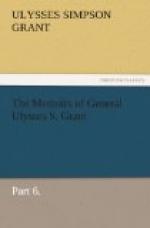Sherman marched his troops from Goldsboro, up to Manchester, on the south side of the James River, opposite Richmond, and there put them in camp, while he went back to Savannah to see what the situation was there.
It was during this trip that the last outrage was committed upon him. Halleck had been sent to Richmond to command Virginia, and had issued orders prohibiting even Sherman’s own troops from obeying his, Sherman’s, orders. Sherman met the papers on his return, containing this order of Halleck, and very justly felt indignant at the outrage. On his arrival at Fortress Monroe returning from Savannah, Sherman received an invitation from Halleck to come to Richmond and be his guest. This he indignantly refused, and informed Halleck, furthermore, that he had seen his order. He also stated that he was coming up to take command of his troops, and as he marched through it would probably be as well for Halleck not to show himself, because he (Sherman) would not be responsible for what some rash person might do through indignation for the treatment he had received. Very soon after that, Sherman received orders from me to proceed to Washington City, and to go into camp on the south side of the city pending the mustering-out of the troops.
There was no incident worth noting in the march northward from Goldsboro, to Richmond, or in that from Richmond to Washington City. The army, however, commanded by Sherman, which had been engaged in all the battles of the West and had marched from the Mississippi through the Southern States to the sea, from there to Goldsboro, and thence to Washington City, had passed over many of the battle-fields of the Army of the Potomac, thus having seen, to a greater extent than any other body of troops, the entire theatre of the four years’ war for the preservation of the Union.
The march of Sherman’s army from Atlanta to the sea and north to Goldsboro, while it was not accompanied with the danger that was anticipated, yet was magnificent in its results, and equally magnificent in the way it was conducted. It had an important bearing, in various ways, upon the great object we had in view, that of closing the war. All the States east of the Mississippi River up to the State of Georgia, had felt the hardships of the war. Georgia, and South Carolina, and almost all of North Carolina, up to this time, had been exempt from invasion by the Northern armies, except upon their immediate sea coasts. Their newspapers had given such an account of Confederate success, that the people who remained at home had been convinced that the Yankees had been whipped from first to last, and driven from pillar to post, and that now they could hardly be holding out for any other purpose than to find a way out of the war with honor to themselves.
Even during this march of Sherman’s the newspapers in his front were proclaiming daily that his army was nothing better than a mob of men who were frightened out of their wits and hastening, panic-stricken, to try to get under the cover of our navy for protection against the Southern people. As the army was seen marching on triumphantly, however, the minds of the people became disabused and they saw the true state of affairs. In turn they became disheartened, and would have been glad to submit without compromise.




